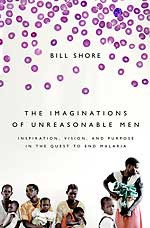
The Imaginations of Unreasonable Men: Inspiration, Vision, and Purpose in the Quest to End Malaria
Bill Shore
320 pages, PublicAffairs, 2010
The eradication of malaria is an “audacious goal,” according to Melinda Gates. “But to aspire to anything less is just far too timid a goal for the age we’re in. It’s a waste of the world’s talent and intelligence, and it’s wrong and unfair to the people who are suffering from this disease.” These words, uttered in 2007 by one of the world’s more admired philanthropists, sum up the spirit of Bill Shore’s latest book, The Imaginations of Unreasonable Men.
An unabashed enthusiast for technology and social innovation, Shore contrasts a clinician’s obligation to treat individual patients’ symptoms with the work of medical research teams whose mission is to find the cure that can eradicate malaria. It is the approach of this latter group that he argues philanthropists should embrace, urging them to leverage markets to achieve their aim. “When we focus on the one rather than the many, on the symptom rather than the cause, on what we can accomplish on our own rather than on what needs to be accomplished by the broader community, we neglect our greatest opportunities to do the greatest good,” he writes.
Shore points to the success of low-tech preventive measures, such as the distribution of bed nets. But he notes that malaria continues to take its toll, with the World Health Organization (WHO) reporting 243 million cases and 863,000 deaths from malaria in 2009. Between 300 million and 500 million people are infected with malaria each year, and although adults usually survive, approximately 3,000 African children die from malaria each day. Almost 50 million of the world’s poor have died of malaria in the past 15 years. The economic toll in Africa is believed to be billions of dollars per year. Despite these shattering statistics, Shore tells us that global spending on malaria is less than $2 billion per year.
But although there has never been a vaccine for a parasitic virus such as malaria, a small number of people are seeking to create one. The WHO is currently tracking 35 vaccine development efforts. Shore tells the stories of many of these inspirational scientists and those who provided the support for their quest.
Shore’s book starts with the source of its inspiration: a young girl he met in Yetebon, Ethiopia, who later died unnecessarily of malaria. This experience set him off in search of an answer to the daunting challenges that malaria presents. What he found were bold innovators—“unreasonable men”—who are dedicating their lives to developing the first vaccine.
Among those he describes is Steve Hoffman, whose innovation, entrepreneurship, leadership, and willingness to do whatever it takes to save children from malaria have brought him many steps closer to the disease’s eradication. Hoff man is seeking to develop a vaccine through extracting parasites from the salivary glands of malaria-infected mosquitoes—a technique previously dismissed by his peers. Sanaria, his private biotech firm, is the only company in the world that is focusing entirely on malaria vaccine development, according to Shore. Through his attempt to bring an existing solution to scale, Hoff man is combining science, philanthropy, and market economics—a model that Shore argues removes “the market gaps that so often undermine social solutions.”
But strategy is not the sole focus of the book. Shore describes the spirit, attitude, and character that drive the scientists he meets, appealing to the inventor in all of us. He summons the reader to stretch further, to imagine new solutions, to take seemingly unreasonable risks to address the sources of daily dangers faced by the poor. Shore outlines what he calls the critical “character qualities” of those who seek to tackle the dangers faced by politically and economically marginalized populations around the world. He notes that the invisible hand of the market will not alone solve the endemic problems they face. Finding solutions requires “irrational self-confidence” and “a willingness to take risks that often seem unreasonable right up until the moment they succeed.”
At the heart of Shore’s analysis of necessary qualities, strategies, and risk taking is an emphasis on the importance of innovation. He cites some of the most successful social innovations, including Wendy Kopp’s Teach for America and Victoria Hale’s OneWorld Health, among others. Shore argues that these triumphs begin with a belief that anything is possible, and anything less is simply a “failure of imagination.”
At times the author seems infatuated with the world of scientific discovery and technology innovation, wowed by the bold curiosity of a profession that perseveres and won’t take no for an answer. But his central message flows naturally from his energizing and at times breathless enthusiasm. When faced with bone-chilling statistics, “unreasonable” risk taking is the only reasonable response.
Furthermore, this eagerness for taking on intractable problems has been a hallmark of Shore’s professional life. He founded the national nonprofit Share Our Strength in 1984 in response to the Ethiopian famine and to concern about hunger in the United States. Shore’s previous career in politics, along with his passion for philanthropy and innovation, is the source of his view that we can indeed find solutions to society’s largest problems.
He has practiced what he preaches. And the motivator for much of his work is captured in the book’s mantra: “Good is not good enough.”
Jane Wales is vice president of philanthropy and society at the Aspen Institute, founding CEO of the Global Philanthropy Forum, and CEO of the World Affairs Council of Northern California. Previously, Wales served as special assistant to the president and senior director of the National Security Council in the Clinton administration, as well as associate director of the White House Office of Science and Technology Policy.

